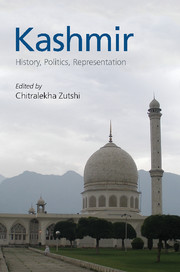Book contents
- Frontmatter
- Dedication
- Contents
- Acknowledgements
- Map 1 Pre-Partition Jammu and Kashmir
- Map 2 Contemporary Kashmir
- Introduction: New Directions in the Study of Kashmir
- PART I HISTORY
- 1 To ‘Tear the Mask off the Face of the Past’: Archaeology and Politics in Jammu and Kashmir
- 2 Contesting Urban Space: Shrine Culture and the Discourse on Kashmiri Muslim Identities and Protest in the Late Nineteenth and Early Twentieth Centuries
- 3 The Rise and Fall of New Kashmir
- 4 Kashmiri Visions of Freedom: The Past and the Present
- PART II POLITICS
- PART III REPRESENTATION
- Contributors
- Index
1 - To ‘Tear the Mask off the Face of the Past’: Archaeology and Politics in Jammu and Kashmir
from PART I - HISTORY
Published online by Cambridge University Press: 03 August 2019
- Frontmatter
- Dedication
- Contents
- Acknowledgements
- Map 1 Pre-Partition Jammu and Kashmir
- Map 2 Contemporary Kashmir
- Introduction: New Directions in the Study of Kashmir
- PART I HISTORY
- 1 To ‘Tear the Mask off the Face of the Past’: Archaeology and Politics in Jammu and Kashmir
- 2 Contesting Urban Space: Shrine Culture and the Discourse on Kashmiri Muslim Identities and Protest in the Late Nineteenth and Early Twentieth Centuries
- 3 The Rise and Fall of New Kashmir
- 4 Kashmiri Visions of Freedom: The Past and the Present
- PART II POLITICS
- PART III REPRESENTATION
- Contributors
- Index
Summary
Introduction
On 6 December 1992, when Hindu nationalists hammered down to rubble in full public view a sixteenth-century mosque in the northern Indian city of Ayodhya, it would seem that the British colonial project of archaeological conservation had also been decisively dismantled. The justification offered for the destruction of this particular mosque, built in 1528 by Mir Baqi, a general of the first Mughal emperor Babur (r. 1526–30) was the ‘righting’ of a historical wrong (Elst, 1993, 20–35). Hindu supremacists insist that Babur's general had destroyed a temple marking the birthplace of the Hindu God Ram to yield room for the mosque.
Given these circumstances, the third meeting of the World Archaeological Congress held in New Delhi could not have been more ill-timed, taking place as it did in 1994 during the second anniversary of the demolition of Babur's mosque. With Indian archaeologists and historians divided on the question of whether an earlier Hindu temple had stood on the site, the Congress began and ended in fiasco. The debacle was precipitated by the organizing committee's having ‘become identified with the Hindu cause’. Even the Indian Government's ostrich stance of discouraging any discussion of the ‘politically and communally’ charged issue of the mosque/temple could not prevent pandemonium. Not only had the reputation of Indian archaeology been tarnished, but the Congress gave ‘rise to very great concern about the way in which archaeology in India is being politically manipulated’ (Merriman, 1995, 20; Bernbeck and Pollock, 1996).
Yet, while the 1994 gathering had placed the ‘crisis’ of Indian archaeology under international scrutiny, the association between archaeology and politics was neither peculiarly Indian nor particularly novel. Nor was the conflict over this specific site new. As early as in 1856, officials of the British East India Company newly in control at Ayodhya, had noted stories of contested claims to the shrine (van der Veer, 1995, 2; Srivastava, 1991, 45). Still, to overemphasize continuity obfuscates more than it illuminates. First, between 1856 and the 1990s, the context and the nature of the dispute had been profoundly altered. In the mid-nineteenth century, the conflict had been a purely local matter. From the end of the century onwards, it was instrumentally and symbolically yoked to a politics of Hindu and Muslim religious nationalism seeking monolithic all-India constituencies through contests over sacred centres (van der Veer, 1995, 11).
- Type
- Chapter
- Information
- KashmirHistory, Politics, Representation, pp. 25 - 50Publisher: Cambridge University PressPrint publication year: 2017



